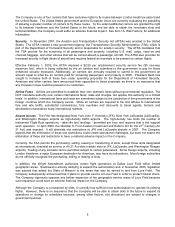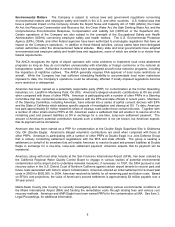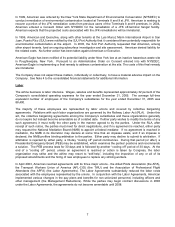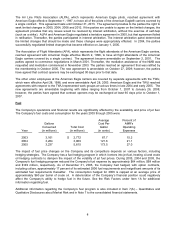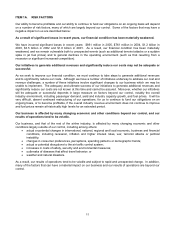American Airlines 2005 Annual Report Download - page 18
Download and view the complete annual report
Please find page 18 of the 2005 American Airlines annual report below. You can navigate through the pages in the report by either clicking on the pages listed below, or by using the keyword search tool below to find specific information within the annual report.15
Our results of operations may be affected by changes in law and future actions taken by governmental agencies
having jurisdiction over our operations, including:
• changes in the law which affect the services that can be offered by airlines in particular markets and at
particular airports;
• the granting and timing of certain governmental approvals (including foreign government approvals)
needed for codesharing alliances and other arrangements with other airlines;
• restrictions on competitive practices (for example court orders, or agency regulations or orders, that
would curtail an airline’s ability to respond to a competitor);
• the adoption of regulations that impact customer service standards (for example new passenger security
standards); or
• the adoption of more restrictive locally-imposed noise restrictions.
In November 2005, the United States and the European Union reached a tentative air services agreement that
would provide airlines from the United States and E.U. member states open access to each other’s markets, with
freedom of pricing and unlimited rights to fly beyond the United States and both within and beyond the E.U. The
tentative agreement is subject to approval by the E.U. Transport Council of Ministers. Under the agreement,
every U.S. and E.U. airline would be authorized to operate between airports in the United States and London’s
Heathrow Airport. Only three airlines besides American are currently allowed to provide that service and
Heathrow routes have historically been among our most profitable. The agreement, if approved, would result in
our facing increased competition in serving Heathrow if additional carriers are able to obtain necessary slots and
terminal facilities.
We currently serve the Dallas/Fort Worth area solely from Dallas/Fort Worth International Airport (DFW).
Southwest Airlines is actively seeking repeal of the Wright Amendment, which is a law that authorizes flight
operations at Dallas Love Field within limited geographic areas. In November 2005, legislation was passed that
added the State of Missouri to the areas that may be served to and from Love Field, and we subsequently
announced that we plan to provide service at Love Field in order to protect market share. Splitting our Dallas/Fort
Worth operations between DFW and Love Field impairs the efficiency and profitability of our hub operations at
DFW, and further expansion of the authorized geographic service areas could have an adverse financial impact
on us.
We could be adversely affected by conflicts overseas or terrorist attacks.
The increased threat of U.S. military involvement in overseas operations has, on occasion, had an adverse
impact on our business, financial position (including access to capital markets) and results of operations, and on
the airline industry in general. Furthermore, during 2003, the war in Iraq had a significant adverse impact on
international and domestic revenues and future bookings. The continuing conflict in Iraq, or other conflicts or
events in the Middle East or elsewhere, may result in similar adverse impacts.
The Terrorist Attacks had a material adverse impact on us. The occurrence of another terrorist attack (whether
domestic or international and whether against us or another entity) could again have a material adverse impact
on us.
Our international operations could be adversely affected by numerous events, circumstances or
government actions beyond our control.
Our current international activities and prospects could be adversely affected by factors such as reversals or
delays in the opening of foreign markets, exchange controls, currency and political risks, taxation and changes in
international government regulation of our operations, including the inability to obtain or retain needed route
authorities and/or slots.


